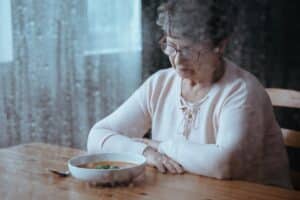The Most Common Reasons Why Seniors Don’t Want To Eat

Home Care in Manteca CA
If you have noticed that your senior parent seems to be losing their appetite, you could be right. It can be a challenge to get seniors to eat enough to stay healthy. Malnutrition is a very common problem in seniors because many seniors just aren’t eating enough. They also could be eating the wrong kinds of foods, so they don’t get the nutrition they need.
If your senior parent is losing weight or you’re worried because they are not eating regular meals, home care can help. A home care provider can help seniors with tasks like preparing meals and doing the dishes. And home care providers can share meals with seniors, which often encourages them to eat more.
There are many reasons why seniors lose their appetites as they get older. Some of the reasons are physical, but some are emotional. The most common reasons why seniors stop eating or aren’t eating enough are:
Changes In Taste or Smell
As seniors get older their sense of smell decreases. If your senior parent can’t smell the delicious steak you made them or the homemade cookies that you made they probably won’t care about eating them. The sense of taste can also diminish as seniors get older. If food tastes bland and has no real flavor, you wouldn’t want to eat it either.
Medication Side Effects
A very common reason why seniors lose their appetites is medication side effects. Seniors may be nauseous from their medication, or they could experience changes in the way that food tastes, or medication can also decrease appetite.
Chronic Illness
Seniors that are in chronic pain or who are fighting chronic illnesses like cancer, depression, IBS, and other illnesses may not have much desire for food. Seniors who have dental problems or poor fitting dentures may also not want to eat very often.
Digestive Health Problems
Seniors who are experiencing serious gastrointestinal problems like bloating, constipation, acid reflux, or heartburn may not want to eat because of the impact that food has on their chronic digestive issues.
Inability To Use Utensils Properly
Seniors that have poor grip strength, tremors, or arthritis in their hands and fingers may find it too difficult to grip utensils like a knife and fork. They also can have difficulty holding a glass, which increases the chances they will become dehydrated.
Depression Or Anxiety
Seniors who are struggling with depression may find that decreased appetite or inability to eat is one of the symptoms of depression that they must manage. Loneliness and isolation can also make seniors less likely to eat regular meals. Home care can help seniors who are lonely feel more connected to the world. And sharing meals with a home care provider often is exactly what seniors need to get them to eat more.
Change In Metabolism
As people get older their metabolism naturally slows down. This is one of the reasons why it’s so easy to gain weight as you get older. If your senior parent is experiencing age-related metabolism changes, they may just not be hungry very often.
If you or an aging loved one is considering home care in Manteca, CA, please contact the caring staff at Provident Care Home Care today at (209) 578-1210.
- Creating a Plan for Aging in Place - July 26, 2024
- What Can Families Do to Help Seniors Avoid Boredom and Depression? - July 19, 2024
- Helping Seniors With Alzheimer’s or Dementia Sleep Better - July 12, 2024
